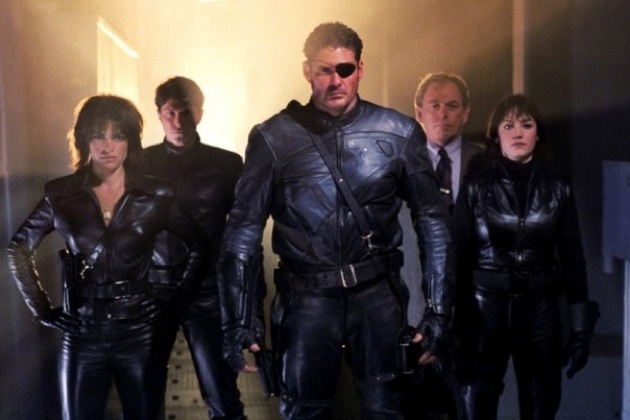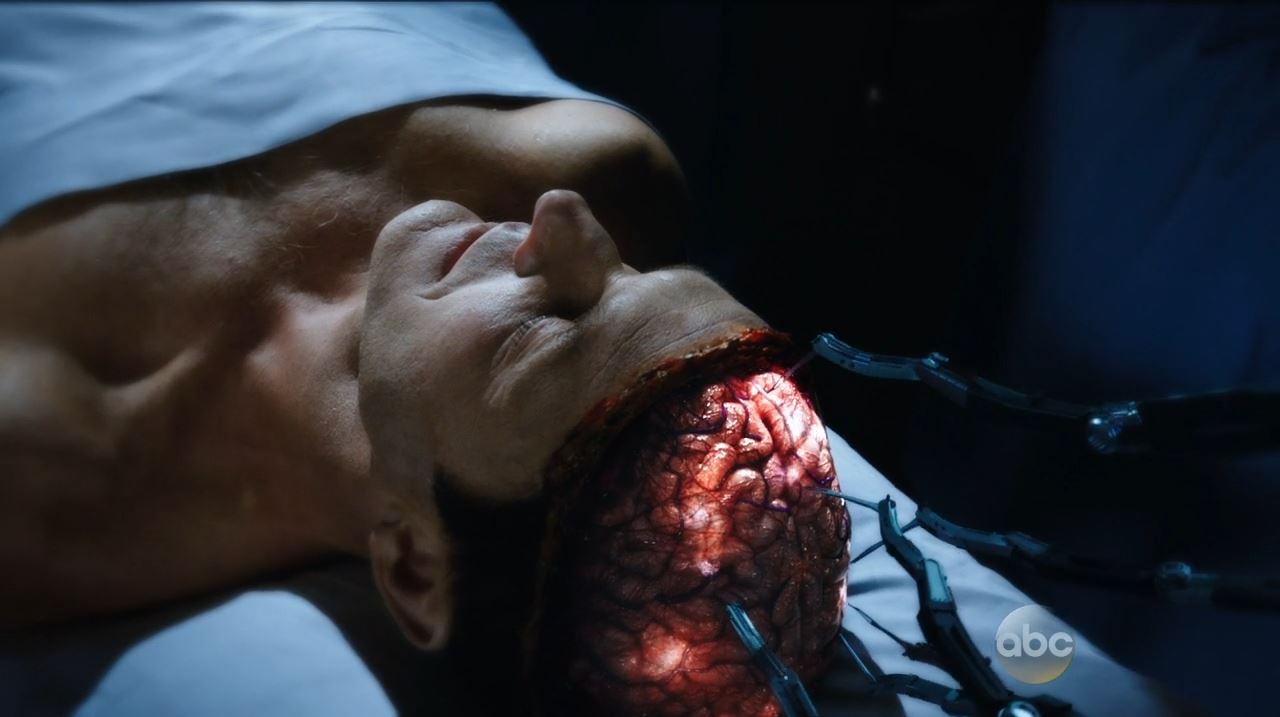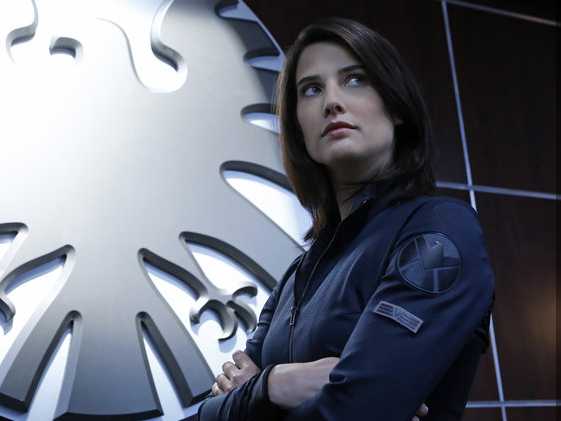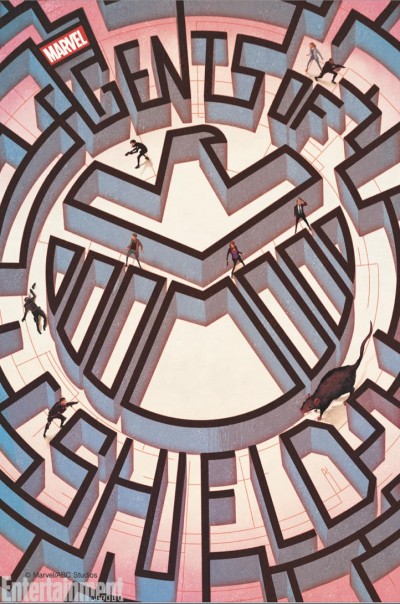As the credits rolled on Captain America 2: The Winter Soldier, I turned to my friend and said, “That movie was everything that I’ve wanted Agents of S.H.I.E.L.D. to be.” But despite what the producers might think, it wasn’t because of the marquee names and big explosive action scenes. I was talking about the espionage, the intrigue and excitement of plainclothes heroes digging deeper and deeper into a conspiracy and trying to do what’s objectively “right” in an increasingly complicated world.
Fortunately, this week’s game-changing episode of Agents of S.H.I.E.L.D. got me pretty excited. Unfortunately, that’s also the problem with Agents of S.H.I.E.L.D. and why I fear it’s doomed to fail. (*spoilers for the show and Captain America: The Winter Soldier* to follow, obviously)
Part of my continuing issue with the show has been its lack of edge-of-your-seat thrills—and again, I’m not necessarily talking about world-threatening villains and big-budget helicarrier explosions. For a show about secret agents in a world full of superheroes, the stakes have never quite been high enough, and the subtle hints of at a larger story have hardly elevated past the winks and nods to Marvel continuity. Yes, the producers have done a good job of seeding along all of the little bits of tech and villany—Deathlok, Ian Quinn, et cetera—but the emotional and thematic throughlines of the series so far have been severely lacking. Coulson’s resurrection and Skye’s origins are both intriguing, but they’re not enough to carry the narrative through. After seeing the Captain America 2 tie-in episodes, I understand now that it’s because the story wasn’t allowed to become anything bigger.
“Our challenge was that we couldn’t say the ‘H word’ until after Captain America 2 . . . so we had to have an ongoing threat that we’ve called Centipede, that we’ve called The Clairvoyant, that we’ve called other things, because we could not say the word Hydra,” explained producer Jeff Bell in a recent interview with Entertainment Weekly. Jed Whedon added, in an interview with Comic Book Resources, “We couldn’t really have anybody bad within the organization, we couldn’t paint the organization in a negative light, and we couldn’t say the H-word. The concept of the Clairvoyant . . . was born out of a desire for us to have our big bad be tied to it, without us being able to talk about it. We came up with the concept of someone who appears to have powers that we can be chasing on our own.”
Or, in other words, “We weren’t allowed to organically build our story to its actual climax because someone else had dibs on it first so we just spun our wheels for 16 episodes instead.”

I understand that the big reveals—that S.H.I.E.L.D. has been corrupt almost from the start, and are now dismantled; the whole Winter Soldier conspiracy and Alexander Pierce and Project Insight blowing up—had to happen on the big screen. But why couldn’t they allow the show to hint at the corruption of S.H.I.E.L.D. from the start? It’s about a secretive organization! Lies and corruption are in the DNA of that kind of story! Even shows like Fringe (which Bell worked on), Dollhouse (which Jed Whedon and Maurissa Tancharoen worked on), and The X-Files all hinted towards something else insidious going on in the background; someone pulling the strings behind the scenes, something bigger than our characters. That’s what keeps people watching and hooked (see also: LOST).
Coulson’s team has barely had to tackle with bureaucracy, and even when they have, it’s been easily resolved. That’s also why the continuing thread of Coulson’s resurrection hasn’t worked as well—of course S.H.I.E.L.D. would have all kinds of crazy technology that isn’t public, and using it to save the life of a prized agent isn’t really all that insidious, even if the circumstances were a bit shady. Instead, the latter half of S.H.I.E.L.D.’s first season has just relied on “dun…dun…DUN!” cliffhangers to end every episode, in hopes of getting you to tune in next week. They couldn’t have an overarching story with narrative tension that pulls the viewer back, so they used quick and easy stingers as if to say, “But next week! Something will ACTUALLY happen! We swear!”

What if Melinda May’s spying on Coulson had been revealed in the second episode and never resolved until this point in the season? Or what if the show took a note from the recent Secret Warriors comic book series and had started off by depicting Coulson’s team as one of Nick Fury’s hand-picked squads of trustworthy agents? Especially considering that Fury knew that something was rotten in S.H.I.E.L.D.? (Maybe tie it in to AIM, who was established in Iron Man 3, and has a Hydra connection in the comics?) Would that really have spoiled Captain America 2? The Hydra reveal could have still been saved for the film, particularly the fact that it went so deep. By then we’d be so invested in the characters that our minds would be even more blown when Melinda May revealed that not only had she been spying for Fury, but that the purpose of the team has been a lie all along as well. A twist within a twist! That’s what happens in secret agent stories!
When Coulson realized that the Clairvoyant was an agent of S.H.I.E.L.D., my reaction was, “Well yes, of course s/he is. This is a show about secret agents.” It was made even more disappointing by knowing that the Bigger Bad behind this Big Bad had already lost. (Yes, it’s entirely possible that there’s another twist coming with the Clairvoyant and Ward—at least there’d better be). If the show is now going to be about Coulson’s team hunting the splintered Hydra factions then what was the point of the preceding 16 episodes? Why not just launch the series spinning out of Captain America 2, as Fury’s superhero secret agent cleanup crew? Don’t get me wrong, I’m as excited as anyone else is for the end of this season, but it still has me wondering what the point of everything else was up until now.

I realize that Marvel Studios is in a difficult position, trying to pull off this otherwise unprecedented transmedia crossover, but so far it seems that their insistence on playing it safe is the very thing that’s holding them back. Maybe they should consider looking to some of their own comic book source material for inspiration—the aforementioned Secret Warriors, which influenced some of Captain America 2’s plot, or Brian Michael Bendis’s multi-year New Avengers / Secret Invasion epic for some real clever and dramatic drama of slow-building trust issues.
More importantly, they need to let Agents of S.H.I.E.L.D. be a good show that stands on its own, instead of worrying so much about movie tie-ins and celebrity cameos. No one’s going to complain about Iron Man not appearing if the show is compelling and dramatic and the stakes are high enough. Make it a thrilling enough espionage story so that we don’t need Robert Downey, Jr. or another appearance by Stan Lee. As it is right now, the safety net of rules that have been put in place by the studio have essentially relegated the show to the status of Ongoing Hour-Long Commercial To Promote Our Bigger Budget Movies Which We Obviously Care More About. And frankly, no one wants to watch that.
They would, however, want to watch this:

Thom Dunn was once paid $200 to dress up as Spider-Man and sign autographs at a Walmart. It was the best day ever. He is a writer and musician who enjoys Oxford commas, metaphysics, and romantic clichés (especially when they involve whiskey). Thom is a graduate of Clarion Writer’s Workshop at UCSD, and he firmly believes that Journey’s “Don’t Stop Believing” is the single worst atrocity committed against mankind. Find out more at thomdunn.net.










